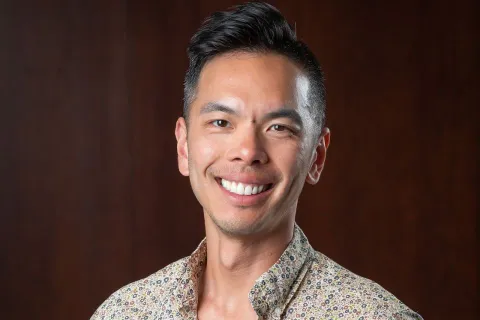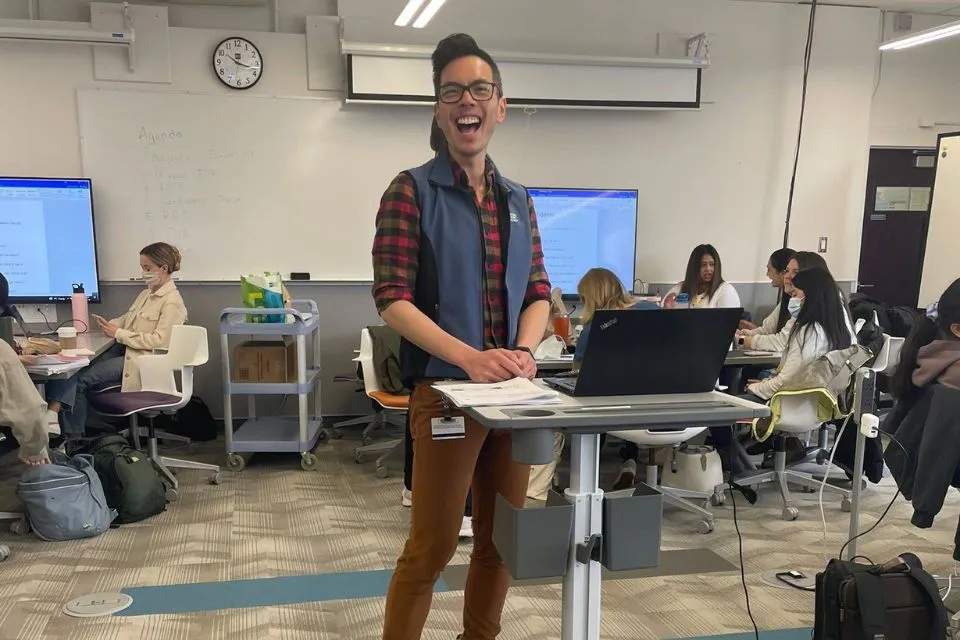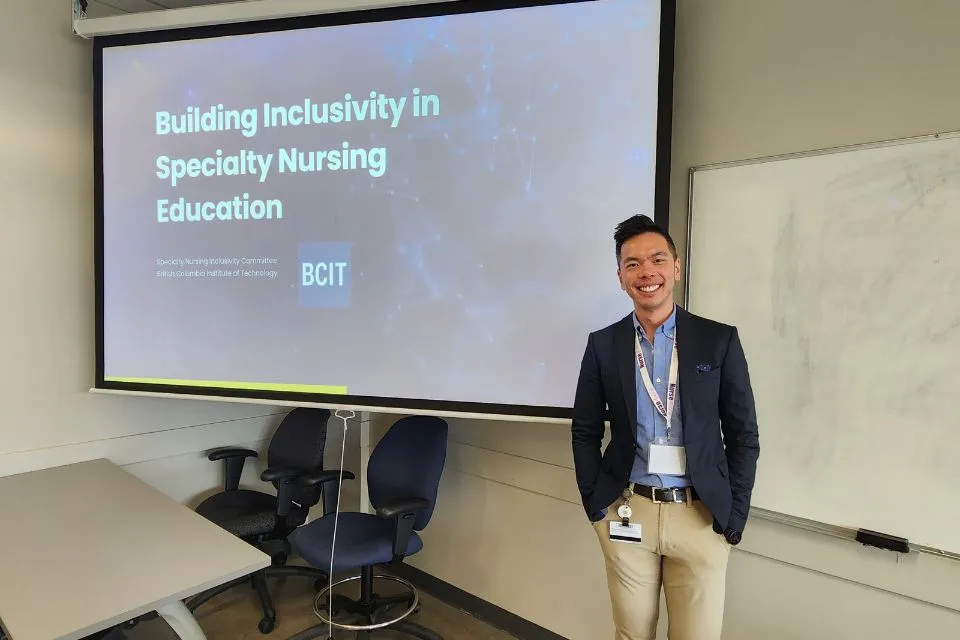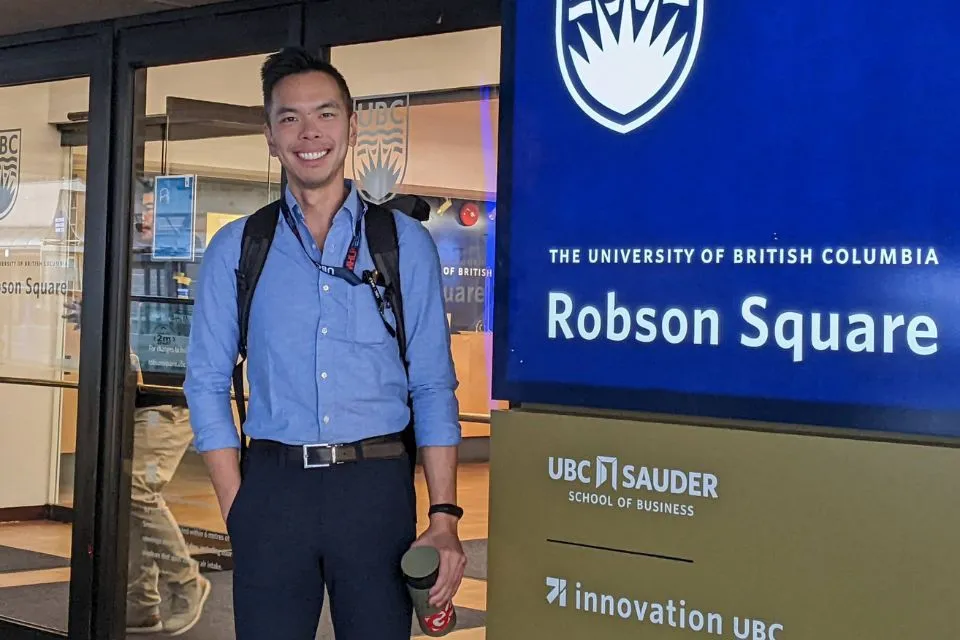“Lean into curiosity, keeping an open-mind, and compassion towards yourself and others. We are more than just students, we have our own lived experiences that shape how we show up.”

Ellison Chung
- Degree:
- Master of Health and Leadership Policy
- Grad year: 2024
- Program:
- Campus: Vancouver
Working in emergency departments as a registered nurse and nurse educator for over a decade, I recognized that the dynamic nature of the two helped shape who I was and who I wanted to be going into graduate school.
As a nurse and educator, I became deeply intrigued with discovering human stories and co-designing environments where everyone feels heard. From patients and staff, to the built environment, I believe everyone should have a say in how healthcare can be delivered.
Currently, I’m a clinical education consultant for Provincial Health Services Authority, working on initiatives to help bolster support for the frontline but also looking at how we build more equity into our healthcare system. Looking at health through the lens of education, I collaborate with system partners to strategize pathways for educator development.

Born and raised in the unceded, ancestral, and traditional territorities of the xʷməθkwəy̓əm (Musqueam), Skwxwú7mesh Úxwumixw (Squamish Nation), and səlil̓ilw̓ətaʔɬ /Selilwitulh (Tsleil-Waututh) Nations, or colonially Vancouver, I recently completely the Masters of Health Leadership and Policy in Clinical Education at UBC. Knowing the importance of keeping a healthy work-life balance, you’ll find me in the mountains hiking and camping with my partner and his adorable tabby cat.
Why did you pursue the Master of Health and Leadership Policy - Clinical Education?
Passionate for education and educational leadership, I found myself wondering how to further my career, without compromising my love for connection. I found the Master of Health Leadership and Policy as a great partnership between business and healthcare leadership with clinical education. I knew my interest in equity, diversity, and inclusion was a main driver for my work within the healthcare system, so I wanted to have a program that leaned into those approaches and would help give me tools to create system changes.
While working with Drs. Colleen Varcoe and Annette Brown from UBC through EQUIP, I recognized that I wanted to be part of an institution that stood true to their values about raising up voices of the underrepresented such as Indigenous communities and members of the BIPOC community. I’m glad I decided to join!
What did you unexpectedly learn as part of your degree?
The most valuable skill I learned was the ability to create, adapt and share change. There is more than just communicating a vision when it comes to seeing change, especially in healthcare. I recognized through MHLP that we need to involve our partners throughout the process. Through inter-professional collaboration and involving our patient partners, we aim to create a sustainable system that is responsive to the needs of our citizens now and for generations to come.
I was so fortunate to be studying as a part time student and achieving my degree over two years. The connections I made along the way really helped to shape my experience and my future. The blend of engineers and healthcare leaders in our program provided different perspectives on how one might interact and shape our system. When we talk about diversity and inclusion, our programs had people from all different lived experiences and that built a community where we could share our key learnings.

What challenges did you face and overcome during your degree?
The biggest challenge I had coming back into graduate school having worked for over a decade, was learning that I could reach out for support. Often times as a student, I had to reframe for myself the word perfection and what that meant. I remember there was one project where our team had the most amount of feedback and it felt like we had failed to deliver a quality presentation. However, in our debrief, we recognized that our project only received that much feedback because partners were genuinely invested in our vision and wanting us to succeed in future iterations. Once we got that reframe and a little cheering up, we thrived!
So my advice for future students, lean into each other, build that community of trust, and take feedback as an opportunity to grow.
How did your studies in the Faculty of Applied Science prepare you for the future of work?
My understanding of sustainability and inclusive leadership gave me a lens I didn’t have before. I always knew climate change was an issue that would cause us to rethink about how we approached healthcare problems, but I did not know how to interpret the data. Through MHLP, I was able to become more informed on issues in climate change that would ultimately impact my care of patients and staff. Through reading and interpreting ESG reports, I started to understand how changes don’t need to be large, but start with the individual. My small change is that I gave up on my car and started to completely rely on my bike for work and life. I hope to be part of the solution and not part of the problem.
Growing up, being authentically me was difficult. I identify as a cis-gender gay male with Asian descent to immigrant parents. In addition to being a visible minority, I was brought up in a professional landscape where being a male nurse has not traditionally been as prominent. I recognized the privilege in coming to graduate school and completing the MHLP. I also recognize that for underrepresented groups, especially members of our Indigenous communities, they still face barriers in attending and furthering their education. Through this lens, I want to use my position to highlight that it is possible and when you’re at the table, people listen.
As a student, it is important to recognize we are change agents and we can build that community to break down barriers for others.

What are your future plans to make a difference?
My vision for the world of healthcare and education is a network and community of passionate educators sharing what they have learned and roadblocks they have encountered. My hope through gaining graduate education and leadership roles is to build a network where we lean on each other and continue to inspire others to be the best they can be.
Sort of like building a hive, our community can only thrive if we all lean onto each other and lift us up.


